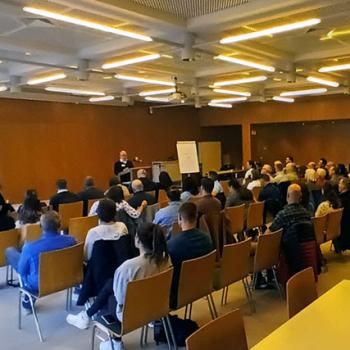Lectionary Reflections
Leviticus 19:1-2, 9-18
February 23, 2014
Here is one of the few times that we Christians dip our little Jesus toes in the vast waters of Levitical law and practice. In general, we avoid all these prescriptions like the plague, announcing that with the coming of Jesus all that old stuff has gone by the boards for us. And a good thing, too, because do I love shrimp and crabs and all that other succulent non-fishy material that teems in the waters of the Gulf of Mexico. I was a pastor for a time in Lake Charles, Louisiana, and if you told anyone there you did not eat shrimp for some sort of old Levitical reason you would likely spend some unpleasant days in the pokey, or worse. I used to get rewarded for pastoral visits with milk cartons of fresh frozen shrimp. I am not going to be bound by any laws that would deny me that! And I wasn't.
It hardly takes a priest to see why this text pops up at the end of Epiphany. Leviticus 19:18 concludes the summary of the law that Jesus offers on at least two occasions in his ministry. "What is the greatest commandment?" he is asked, and his reply is first from Deuteronomy 6:5 that he then adds to Leviticus 19:18 to make a very tasty fortune cookie treat: "You shall love the Lord your God with all your heart, soul, mind, and strength (a bit of interpretation here apparently) and your neighbor as yourself. On that rests all the law and prophets." Luke's lawyer than asks him about who the neighbor is and receives a most unexpected reply, as any reader of Luke 10 knows.
Well, if the aphoristic quality of these famous words was intended to end discussion about what really is important in the religious life, it was a rank failure. The commentary on all this is enormous, frankly heading in two general directions. First, there are those who are convinced that "loving self" is the very essence of the thing. If you cannot love yourself, you just cannot love your neighbor, spouts the 21st-century guru. So, get in touch with yourself, your shakras (of whatever color they may be today), follow your bliss, embrace that embraceable you, and then you may be able to turn to someone else.
I recently spent three days in Sedona, Arizona, one of the very centers of this "turn inward" crowd, and I admit that I was less than impressed. Now, far be it from my cynical self to begrudge those who have had a hard time getting their heads around who they are in fact, but I found much of their self-talk loathsome. There are only so many times I want to hear about "getting my head straight," "finding my power spot," discovering my true "inner eye." And Sedona offers any number of people and places that play right into all this. At the last, this sort of "love of self" is about as far from Leviticus and Luke as one is ever likely to get. Then again, I know that many of these folks care nothing for Leviticus or Luke, but still the self-love demands were first made there for the West, so we should at least try to understand what was intended—navel-gazing not being one intent, I dare to say.
I am absolutely fascinated with just how today's Leviticus passage begins. "When you reap the harvest of your land, you shall not reap to the very edges of your field, or gather the gleanings of your harvest. You shall not strip your vineyard bare, or gather the fallen grapes of your vineyard; you shall leave them for the poor and the immigrant: I am YHWH" (Lev. 19:10-11). There is enough richness in here to fill up a lifetime of commentary on what it really means to love your neighbor as you love yourself, which leads me to the second way to address the question of self love by causing me to raise some questions.
First, just why should I not reap right up to the edges of my field; why should I not strip my vineyard bare of its grapes? After all, they are mine, aren't they? Can I not do whatever I want with what is mine? Is that not the American way? Second, if my incompetent reapers leave piles of gleanings all around, why should I not demand that they go back through my field, correct their sloppy work, and bundle up those gleanings in neat piles for my other workers to drag to my barns? And when my vineyard pickers keep missing masses of my grapes in their clumsy harvesting practices, why should I not demand that they go right back into my vineyards and pick up those fallen grapes for later transport to market along with those grapes they got in the first pass through the vineyard? Just what sort of profligate idiotic farm is this one anyway?
Third, and worst of all, why in all that is capitalistically holy, should those missed gleanings and those fallen grapes be left for—of all people—the poor and the immigrants? I mean, what have they ever done for me? The former are probably deadbeats and the latter are probably illegal, having left their own countries in the attempt to come to mine and to live off me and the energy of my hard labor. It is frankly unfair, inappropriate, and downright disgusting.





